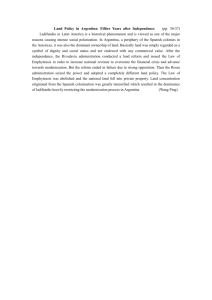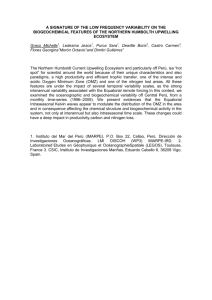Images of Poverty and Inequality in Peru and Argentina
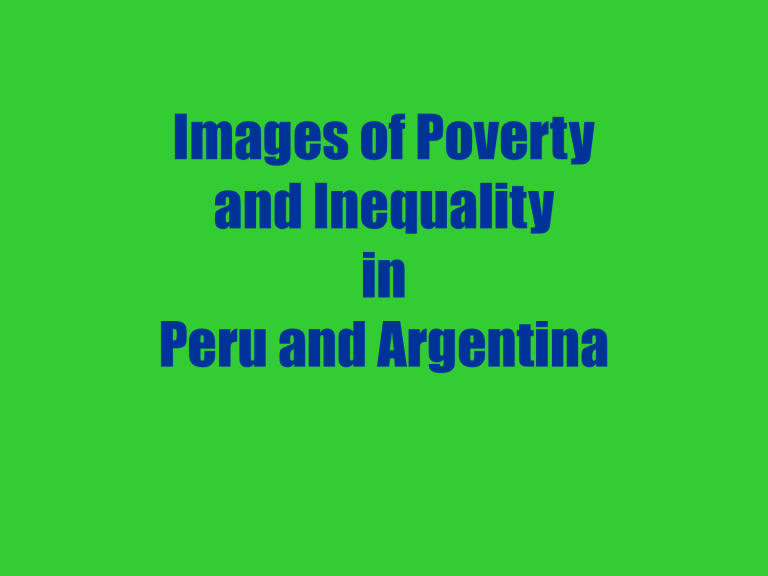
Images of Poverty and Inequality in
Peru and Argentina
Part I: Maps
Note:
Shape files for all maps are from: http://diva.riu.cip.cgiar.org/modules.php?name=Downloads&d_op=viewdownload&cid=6
Data Source: www.inei.gob.pe/Sisd/aplic/consulta.asp
Data Source: Source: www.indec.gov.ar/indec/ingles/iu020303.xls
Data Source: www.inei.gob.pe/Sisd/aplic/consulta.asp
Data Source: Source: www.indec.gov.ar/indec/ingles/iu020303.xls
Data Source: Source: Instituto Nacional de Estadísticas e Informática (INEI). 2002. La Pobreza en el
Perú en 2001: Una ision departamental. Lima, p. 97 www.inei.gob.pe/biblioineipub/bancopub/Est/Lib0500/Lib.pdf
Source : Instituto Nacional de Estadística y Censos (INDEC). 2003.
“Mapa de Necesidades Básicas Insatisfechas 2001.” Aquí se Cuenta:
Revista Informativa del Censo 2001.
No. 7, September, p. 3. www.indec.gov.ar/webcenso/aquisecuenta/Aqui7.pdf
.
Unsatisfied
Basic Needs
Argentina, 2001
Unsatisfied Basic
Needs by Region
Argentina, 2001
Northwest
Cuyo
Pampas
Northeast
Greater Buenos Aires
Source : Instituto Nacional de Estadística y Censos (INDEC). 2003. “Mapa de Necesidades Básicas Insatisfechas 2001.” Aquí se Cuenta: Revista
Informativa del Censo 2001.
No. 7, September, pp. 4-5. www.indec.gov.ar/webcenso/aquisecuenta/Aqui7.pdf
.
Unsatisfied Basic
Needs -
Patagonia,
Argentina, 2001
Source : Instituto Nacional de Estadística y Censos (INDEC). 2003. “Mapa de Necesidades Básicas Insatisfechas 2001.” Aquí se Cuenta: Revista
Informativa del Censo 2001.
No. 7, September, p. 5. www.indec.gov.ar/webcenso/aquisecuenta/Aqui7.pdf
.
Part II:
Images of Poverty and
Inequality
Adobe bricks at the ancient Inca ruins of Pachac ámac. Many people in Perú build their houses out of materials similar to these today.
All photos by Kate Carson.
An example of wattle and daub construction, a traditional building technique in Per ú.
These two settlements are examples of what the
Peruvian government calls
“improvised housing.”
Looking down the main road into the town of Purmamarca, in the state of Jujuy, in Northwest
Argentina.
What percent of the population lives below the poverty line in this state? Below the indigence line?
What percent of households have at least one unsatisfied basic need?
Note that the house on the near left is built of adobe bricks.
A traditional village on the Uros islands, in Lake Titicaca, Per ú. The houses on these islands, as well as the islands themselves, are made of the reeds that grow in the lake. What else do you notice about this picture?
The family that owns this vicu ña lives near the ruins of Sillustani, in the southern highlands (sierra) of Perú. They charge tourists one sol to take a photo of the vicuña. How many pictures would they have to sell in a day to have an income above the poverty line? Above the indigence line? If they sell enough pictures to be above the poverty line, does that mean that they would not be classified as impoverished?
A fisherman gathering his nets near
Paracas, Per ú. Do you think he earns enough money to satisfy his basic needs?
The photo on the left is of a church in the
Barranco district of Lima.
Was the building below the church for this roadside settlement south of Lima?
The picture above is of a popular tourist hotel in
Paracas, Per ú.
The photo to the right is of guano mining operations off the coast near
Paracas.
The contrast of living conditions can be great in a country with high income inequality.
Miraflores District in Lima Pisac in Cusco Department
What percent of the people have at least one NBI in each of these places?
A view of Purmarca,
Jujuy
– one of the poorest areas in
Argentina. How do poverty statistics in Jujuy compare to the
Pampas?
In the Pampas region of Argentina, incomes may differ greatly between the landowners and those who work the land. What do the data for
Argentina say about poverty in this region?
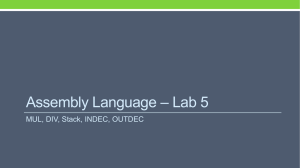
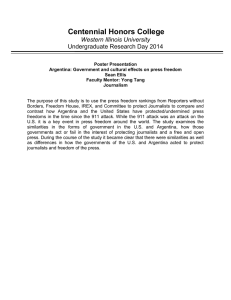
![Alina%27s+biography[1].doc](http://s3.studylib.net/store/data/008053716_1-e26660debd094c135eb326538c217c07-300x300.png)
